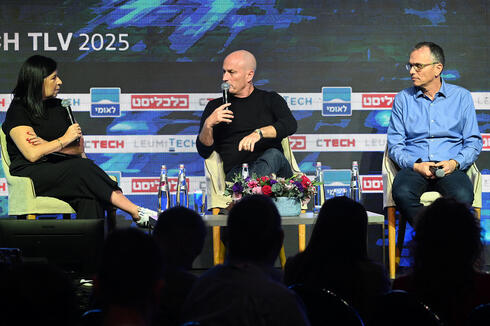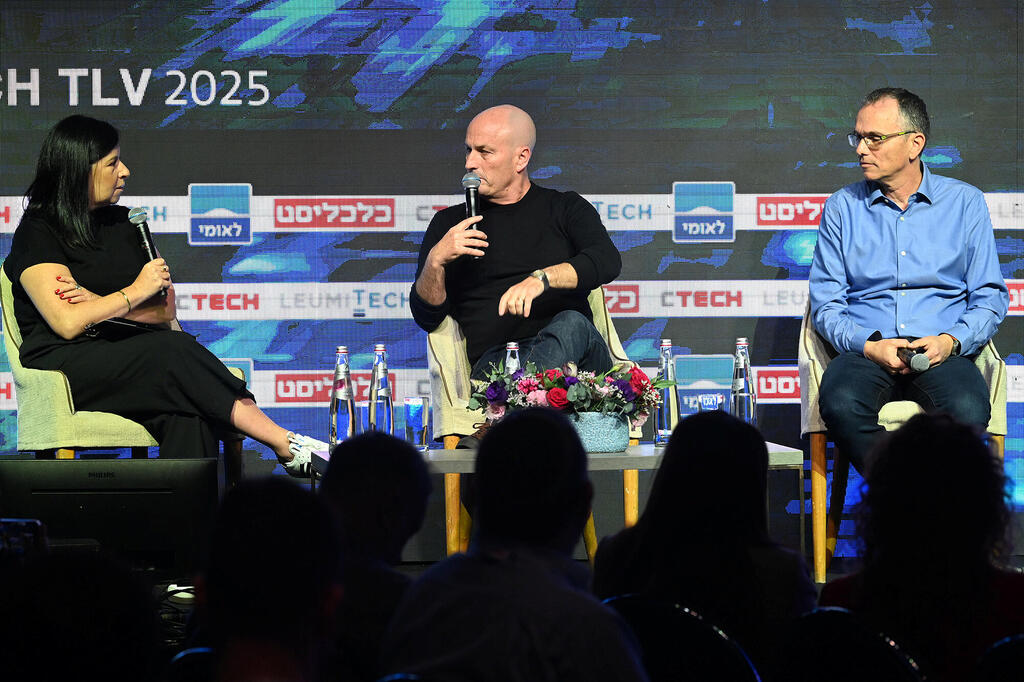
Tech TLV
"There’s a generation of entrepreneurs who’ve already achieved success and are now aiming to build companies that endure"
Gadi Mazor, CEO of BioCatch, added at Tech TLV: "Fifteen years ago, companies were sold for $30M. Today, deals are reaching $400 million or more, and many leaders prefer to build large-scale companies and focus on long-term growth." Ran Maidan, Senior Adviser and Head of Israel at investment firm Permira, added: "We look for a large and growing market, along with a company solving a significant problem—and BioCatch does exactly that."
"There is a generation of startup founders and managers in Israel with ambitions to build companies for the long term," said Gadi Mazor, CEO of BioCatch, at the Calcalist and Bank Leumi Tech TLV conference on Tuesday.
Mazor spoke in a joint conversation with Ran Maidan, Senior Adviser and Head of Israel at investment firm Permira, moderated by Calcalist reporter Sophie Shulman. Last May, Permira acquired control of BioCatch at a valuation of $1.3 billion, following its acquisition of minority shares in the company through a secondary transaction in April 2023.
1 View gallery


Gadi Mazor and Ran Maidan with Calcalist's Sophie Shulman at Tech TLV.
(Photo: Kobi Kuenkas)
Maidan on the journey to acquiring BioCatch:
"It’s not like we just knocked on their door one day," Maidan explained. "Permira had been conducting thorough research since 2021. We aimed to identify the next major trend, and we saw that fraud-related challenges were significantly increasing globally. We wanted to find a company capable of addressing these issues.
"Our search included both global and Israeli markets, and we discovered that BioCatch was located just across the street from our offices in Azrieli Towers. I met with Gadi to discuss an initial investment, offering $50 million at a fair valuation. However, Gadi declined, saying the company didn’t need the funds and wanted to continue on its existing path. Despite this, we stayed in touch. By 2023, we found an opportunity to purchase a small stake from early investors looking to exit. Then, in 2024, we became the majority shareholders after the main shareholders were looking to sell their position."
What guides Permira when making acquisitions?
Maidan outlined three key criteria:
"First, we look for a large and growing market, along with a company solving a significant problem—and BioCatch does exactly that. Second, the company must have an exceptional, innovative product developed by highly talented individuals. When we first evaluated BioCatch, it had annual revenues of $32 million. By the time we invested, it had reached $100 million, and today it’s at $150 million, demonstrating substantial growth.
"Third, and most importantly, we invest in the management team. It’s Gadi and his vision that drove our decision. With combined efforts and the company’s capabilities, we believe we can grow BioCatch into a global public company."
On going public:
Maidan: "You can’t take a company public with annual revenues under $400 million. We plan to continue growing the company for several more years before pursuing an IPO."
Why did BioCatch choose Permira?
Mazor: "We never viewed the deal as selling the company. I wouldn’t call it an exit. It was more like reaching halftime and finding the right partner for the second half.
"When we surpassed $100 million in revenue in October 2023 and achieved unicorn status, it became clear we needed a new mix of shareholders. Permira already held a minority stake, and we chose them as a partner because we had good relationship and we wanted a partner aligned with our vision of growth, not focused on short-term profitability. Our goal was to build a large, sustainable company—not to flip it for a quick profit in two years."
Lessons learned from leadership roles:
Maidan: "Being a CEO is no easy role. One key lesson is to focus on decades, not quarters, to build a strong and sustainable business. Another is understanding that there can only be one captain on the plane—the CEO. It’s not the chairman or the owner. As owners, our role is to support the CEO in achieving success."
Mazor: "Before finalizing the deal, Ran shared his principles for what a CEO must do to succeed, and I agreed with all of them. It was clear that Permira was aligned with our company’s direction and strategy."
The impact of exits on Israeli high-tech:
Mazor: "I’ve been in the industry for several decades. Fifteen years ago, companies were sold for $30 million. Today, deals are reaching $400 million or more, and many leaders prefer to build large-scale companies and focus on long-term growth.
"There’s a generation of entrepreneurs who’ve already achieved some success and are now aiming to build companies that endure. The ambition is there—our challenge is no longer about founders looking to sell too quickly."













